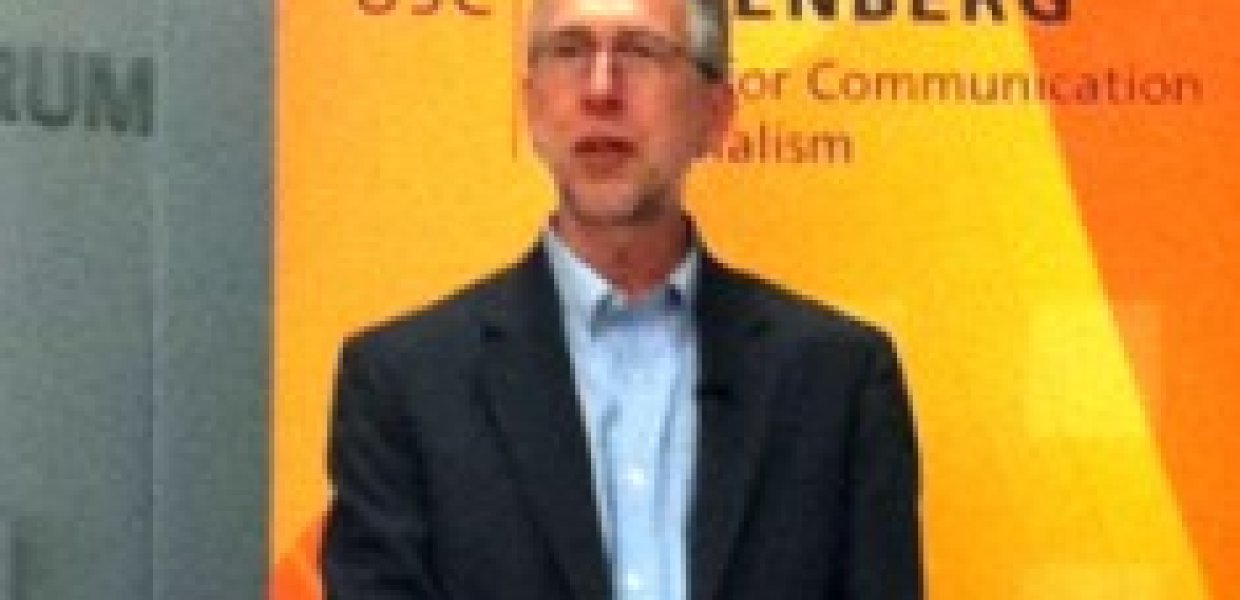By Amelia Brodka Student Writer  The March 26 Annenberg Research Seminar featured Jim Dempsey, the vice president for Public Policy at the Center for Democracy & Technology. Dempsey's presentation, “Technology, Public Policy and the Future of the Internet: An Advocate's View,” outlined the role that past architectural and policy changes played in shaping the nature of the Internet. “It is remarkable to think about how rapidly and dramatically the Internet had grown and become such a powerful platform,” said Dempsey. However, “the Internet has not grown by accident nor is its future ensured,” he said. Dempsey defined the successful policy framework for the Internet as one that emphasizes user control, protects intermediaries from liability, promotes free expression and fosters innovation. Dempsey discussed the way in which telecommunication policy debates have led to the Internet's current structure that “emphasizes openness and competition and freedom of expression,” he said. Dempsey explained how a regulatory action enforced by the Federal Communications Commission in 1968 paved the way for the progression of future Internet technology: The FCC overturned AT&T's attempt to ban any equipment not manufactured by AT&T from being hooked up to the telephone network. Although the AT&T debate was influenced by the invention of the carter phone, the FCC's decision to allow non-AT&T devices to be plugged into the network paved the way for the dial-up modem. Dempsey also discussed the 1996 decision Congress made to free service providers from being liable for the content posted by their users. Therefore, the owners of sites such as YouTube or Facebook are not responsible for illegal content posted on their sites. Instead, the content creators are held liable. In 1997, Congress declared that “the Internet should be subject to the highest form of freedom of expression,” said Dempsey. “Innovation remains at stake in current policy debates,” said Dempsey. Dempsey said that efforts such as SOPA and PIPA show that “members of congress seem to forget what they themselves created."
The March 26 Annenberg Research Seminar featured Jim Dempsey, the vice president for Public Policy at the Center for Democracy & Technology. Dempsey's presentation, “Technology, Public Policy and the Future of the Internet: An Advocate's View,” outlined the role that past architectural and policy changes played in shaping the nature of the Internet. “It is remarkable to think about how rapidly and dramatically the Internet had grown and become such a powerful platform,” said Dempsey. However, “the Internet has not grown by accident nor is its future ensured,” he said. Dempsey defined the successful policy framework for the Internet as one that emphasizes user control, protects intermediaries from liability, promotes free expression and fosters innovation. Dempsey discussed the way in which telecommunication policy debates have led to the Internet's current structure that “emphasizes openness and competition and freedom of expression,” he said. Dempsey explained how a regulatory action enforced by the Federal Communications Commission in 1968 paved the way for the progression of future Internet technology: The FCC overturned AT&T's attempt to ban any equipment not manufactured by AT&T from being hooked up to the telephone network. Although the AT&T debate was influenced by the invention of the carter phone, the FCC's decision to allow non-AT&T devices to be plugged into the network paved the way for the dial-up modem. Dempsey also discussed the 1996 decision Congress made to free service providers from being liable for the content posted by their users. Therefore, the owners of sites such as YouTube or Facebook are not responsible for illegal content posted on their sites. Instead, the content creators are held liable. In 1997, Congress declared that “the Internet should be subject to the highest form of freedom of expression,” said Dempsey. “Innovation remains at stake in current policy debates,” said Dempsey. Dempsey said that efforts such as SOPA and PIPA show that “members of congress seem to forget what they themselves created."
Dempsey discusses Internet policy debates
March 26, 2012
Updated May 3, 2023 11:43 a.m.
